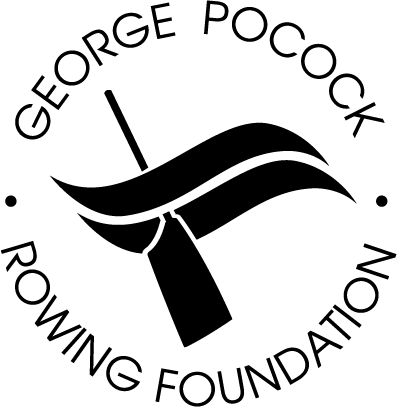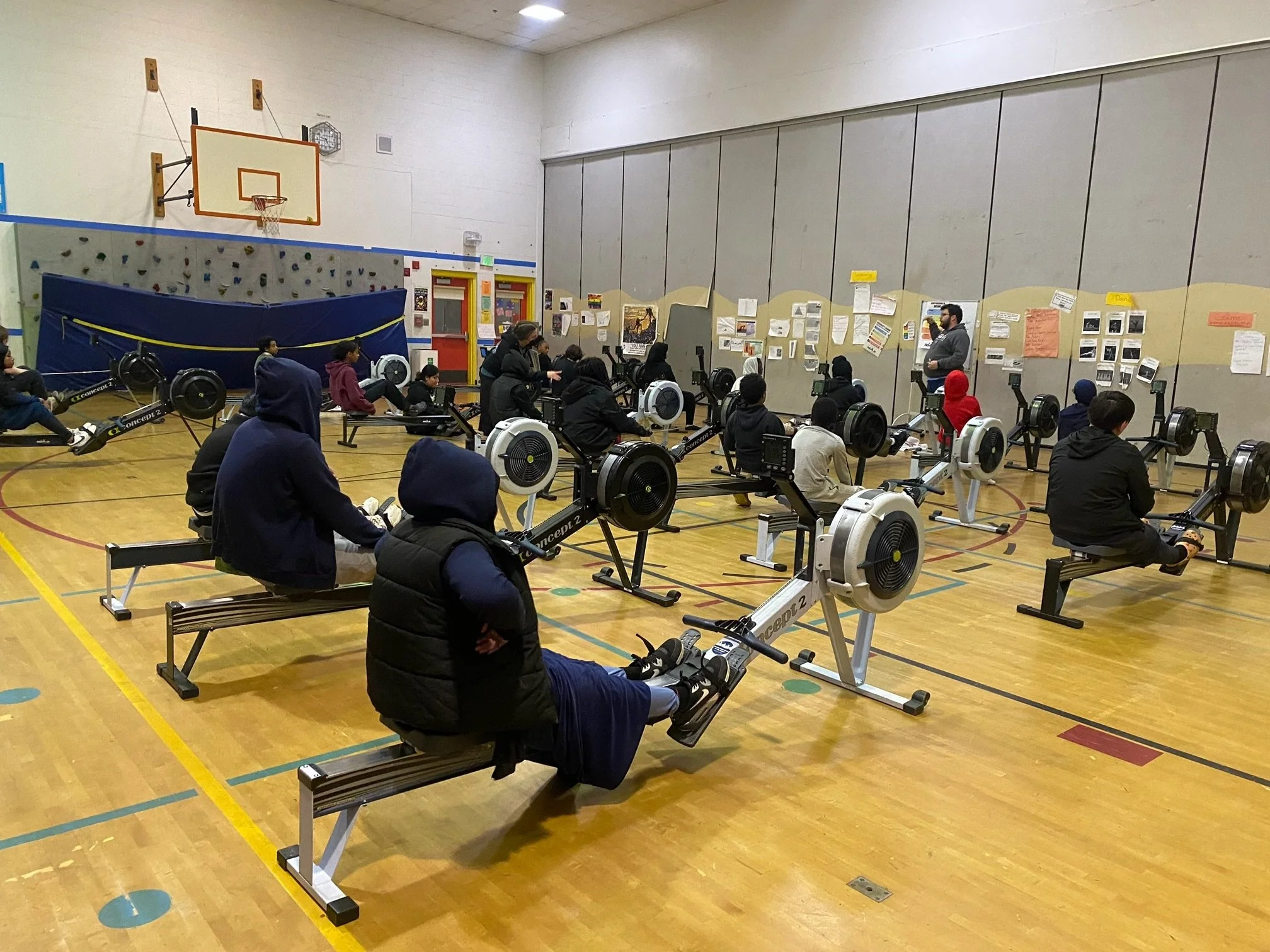People trust people: How one teacher is uplifting her scholars, one erg at a time
People buy from people. People learn from people. People trust people. People.
During a recent visit to an ERG ED® program at Orca K-8, a Seattle Public School serving students in the Columbia City neighborhood, our team witnessed first-hand the impact of people on each other.
In this case, it is a teacher who is making a difference to her students, which is timely as we celebrate Teacher Appreciation Week in May.
ERG ED® is a program that has been in effect for 14 years this year. And yet, it is still largely unknown, despite 55,000 annual participants in 20 school districts across the nation. What makes this program so unique and special, though, is the teachers. The George Pocock Rowing Foundation created and designed this program and provides rowing machines (ergometers, otherwise known as ergs) and the classroom curriculum. Teachers learn how to row and how to teach the rowing stroke at a training hosted by the foundation. Then the teachers implement the program in their Physical Education classrooms.
Teachers like Richard Holbrook, who participates in ERG ED® Stockton in hopes of “inspiring a lifelong love of fitness in his students.”
On this particular visit to ORCA, the teacher, Laura Grow, started the class by reviewing what the students had learned the previous day during their first experience with ERG ED®. This included safely participating on the machine by always keeping two hands on the handle, strapping feet snugly in, setting the appropriate damper level, and safely adjusting loose clothing. Knowing that several students wear skirts during PE class, Laura, wearing a long skirt herself, demonstrated how easy it was to tie it up and still feel comfortable while rowing.
When our team met Laura, she shared that Orca was so grateful for the ERG ED® program and the opportunity to teach rowing to their students. Her gratitude for the foundation and ERG ED® was expressed many times, and the team could feel her sincerity.
“I am so thankful for the support of my district leader, Lori Dunn, and the George Pocock Rowing Foundation’s partnership. ERG ED® has become a highlight of the semester. It has been an honor to learn to row myself as well as get to introduce students to the ergs. ERG ED® offers our students an opportunity to engage in the Physical Education Standards by doing something so special. The gym is transformed from its traditional layout to a boathouse/state-of-the-art fitness center. In this inclusive program, everyone becomes a learner together. Beyond the great workout and experience the students have doing their Ergs in class this opportunity opens a door to something that students may use throughout life whether in a gym, a fitness center, or on the water with a team.
I love how the ergs offer connection to the place we live- a city surrounded by water and boathouses and how the Ergs connect students to their bodies in new ways as they discover muscles and engage in a fun high-intensity cardiorespiratory challenge. It is holistic learning.
This partnership shows that the community cares about our students: Just seeing the Pocock staff bring the ERG rowers to and from the school and answer questions about rowing is meaningful. Orca is a K-8 school. I love to how the younger students see the ERGS with awe, wonder, and a lot of questions. They too look forward to when they are in middle school and get to experience them too.”
Our fondness for Laura only grew as the morning went on.
Laura.
Laura calls all her students “scholars,” which we later learned is because the word helps “raise the bar to make sure the words we use match the expectation we have for students.” Her passion for young people is obvious. A reflective and responsive teacher, Laura’s patience is admirable to all who witness it, and she is resourceful for her students, ensuring their needs are constantly met.
After the safety review, the scholars quickly moved to the machines as the excitement and energy in the room built. The fidgeting and need for movement amongst a group of students this age is palpable, right?
As our team walked around the room assisting with foot straps and ensuring the kids were comfortable on the machines, they could tell that many of the students liked the ergs: they were eager to sit down and row on the machines and they wanted to get the flywheel moving as quickly as possible. Their technique was far better than most of the new adult rowers we’ve seen. They made rowing seem intuitive, like learning how to walk or run. Our hearts were filled with pride for our sport and our program.
The flywheels began to spin and the room hummed.
To be curious, rather than instructional, our team walked around asking the athletes how they were feeling and what they thought about rowing. Some of them weren’t responsive or interested in talking to us (fair!), but some others opened up while we were readjusting their shoes or helping them reach the handle. The young women scholars, in particular, shared how they liked that the machine gave them immediate feedback and told them they were good at rowing. Others pointed to the data on the screen with a look in their eye that told us they were proud, a moment of “Look what I can do!” followed by attempts to get the same result or row faster, time after time. Admiration flowed through us as we realized these kids were approaching rowing in a new way: they weren’t overthinking it, they were just going for it, without judgment or reservation. What a concept.
Consistently inconsistent. That’s middle schoolers. A lot is going on in their bodies and minds, and one stroke is a hard pull, while the next is looking at their neighbor with a face full of hair. Distractions are plentiful and the kids often appear as though they just got a rush of sugar or a burst of energy. They are at such a fun age because they haven’t started worrying too much about what other people think, and they have a playful approach to life. They are a kid, but not at the same time. You can see them beginning to make sense of the adult world at every turn, but (of course) from a child’s body.
After reviewing the rowing stroke and building confidence in their technique, Laura announced a team relay! Yay! Groups of 3-5 scholars would row for 10 minutes on an erg, trying to accumulate the most meters to win a prize. Moments later the race was on, and what a race it was! While off the erg, some scholars would run around the room, frantically checking their opponents' total meters and running back to their erg to report back to their teams. Once on the erg, they gave all they had to the cause. Arms flailing, bodies flying, seats bouncing, chains spinning, “go, go, go!” they would cheer each other on.
In the last thirty seconds of the race, we witnessed the raw and real emotion that adults often struggle to express. One athlete wanted to win so badly, that he took matters into his own hands, even though it wasn’t his turn. Seeing that his teammate was losing steam, this competitor straddled the erg in front of said teammate and started to pull the handle, rowing arms only. It was such a joy to see this young person so hungry for the W.
In the final moments of the race, the room was so loud that we were struggling to focus, but yet, while rowing, the kids were laser-focused, dialed into their monitors, and the hum of their flywheels. It was a good reminder that we sometimes forget; rowing offers a focal point amidst the madness in life.
One scholar finished the race and burst into tears, another beautiful example of pure emotion. Gosh, how precious this age is. Big emotions are brewing and kids are trying to make sense of their feelings in all their experiences. How wonderful that these athletes feel comfortable in this space - a physical education class - to express themselves.
Laura.
Laura was all we could think about at this moment. Creating inclusive, welcoming, safe spaces is our vision at the George Pocock Rowing Foundation and Laura epitomizes this approach.
The room was full of shrieks and excitement as scholars wrote their team’s total meters on the whiteboard. Laura handed out prizes and the athletes celebrated the accomplishments of their classmates. It was soul-filling.
People trust people.
Laura.




